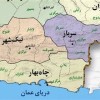Indian State Should Focus on Unconventional Methods: Jamal Nasir Baloch
THE BALOCH PEOPLE IN IRAN’S GRIP

BY JAMAL NASIR BALOCH
The government of Israel has rightfully clarified, repeatedly, the distinction between the Iranian regime and the people living in Iran. Those of us in the Free Balochistan Movement would like to make another distinction that will help the people of Israel understand the depth and breadth of the oppression in Iran.
Iran is not just its people, singular, it is its peoples, plural. Iran is a forced marriage of several nations, each of which suffers the same oppression. Our people, the Baloch nation, is least known. Therefore, we would like to introduce our people to the people of Israel.
The Baloch people speak Balochi, a language of the Medes that is linked with Kurdish and Zaza-Gorani. So, we – the Baloch and the Kurds – had the same ancestors in the distant past.
Baloch people have lived in Balochistan for thousands of years. Balochistan is a vast landmass currently divided between Iran, Pakistan and Afghanistan. It is larger than France and commands approximately 900 miles of Arabian Sea coastline. It is comprised of Pakistan’s province of Balochistan, areas in Sindh in Pakistan and Punjab in India. The Iranian side of Balochistan’s territory includes the province of Sistan va Baluchestan, areas in Hormozgan province from Jask to Bandar Abbas, areas in Kerman and South Khorasan provinces, and in Afghanistan, some southern areas along Pakistan’s and Iran’s borders. It may be clear that our nation is in a geopolitical hot spot.
The Baloch nation successfully established a nation-state in the mid-17th century that governed all parts of Balochistan until November 13, 1839, when the British Empire attacked the capital of Balochistan, Kalat (also spelt Khelat). After the British colonization, Balochistan was systematically divided into three parts. Western parts were merged into Persia in 1871, and Northern parts into Afghanistan in 1893.
The semi-independent eastern part of Balochistan achieved independence on August 11, 1947, but it was occupied by Pakistan only after 227 days. In Pakistan, where antisemitism is promoted by the state, our secular culture helped us to resist such religious extremism. This is evident by the fact that Karachi’s Jewish cemetery is protected by a Baloch family and has been for more than a century.
THE DIVISION and occupation of Balochistan resulted in the plunder of national resources and the systematic ethnic cleansing of the Baloch people by the Islamic republics of Pakistan and Iran. Reza Khan, also known as Reza Shah Pahlavi, and his successors promoted Persian nationalism and non-Persian nations were oppressed. The use of the Balochi language in schools was outlawed and expressions of Baloch identity were barred. New history books were introduced in which the Baloch people were portrayed as being ethnically Persian.
The Shi’ite Islamists who replaced the Shah only made things worse for our people. Soon after the revolution, educated Baloch people who were affiliated with secular or progressive politics were murdered. Those who remained left Balochistan and took refuge in the West. The Islamic regime continued the existing racist and colonial policies of the Pahlavi Dynasty and has adopted new policies directed against the Sunni Baloch population that is based on Shi’ite fundamentalism. This situation continues today. We are being denied who we are as Baloch people.
The Iranian regime is an existential threat to our people, just as it is an existential threat to Israel. The reverse is also true. Both our nations pose an existential challenge to the Iranian regime. In the case of Israel, it is the very presence of fundamental freedoms and democracy in the Middle East. In our case, we are the people sitting on large deposits of iron ore, gold, silver and platinum. Chabahar Port is in the heart of Balochistan and is vital for the regime (as proven in the Iran-Iraq war).
The current Islamic regime has oppressed all nations within its borders, including the Baloch, Kurds, Arabs, Turks and Persians. Iran can change if all nations cooperate on behalf of a genuine transformation. That would, in time, open the way for each nation to decide its own political destiny.
Democracy and freedom in Iran could provide an opportunity, not only to Persians, but also to non-Persian nations in the region. We believe that to achieve this we need to create cooperation for freedom across the Middle East, and by doing so, create security for all.
The writer is an activist of Free Balochistan Movement and a member of Chatham House. He can be reached at jnbaloch@hotmail.co.uk
Courtesy: The Jerusalem Post









